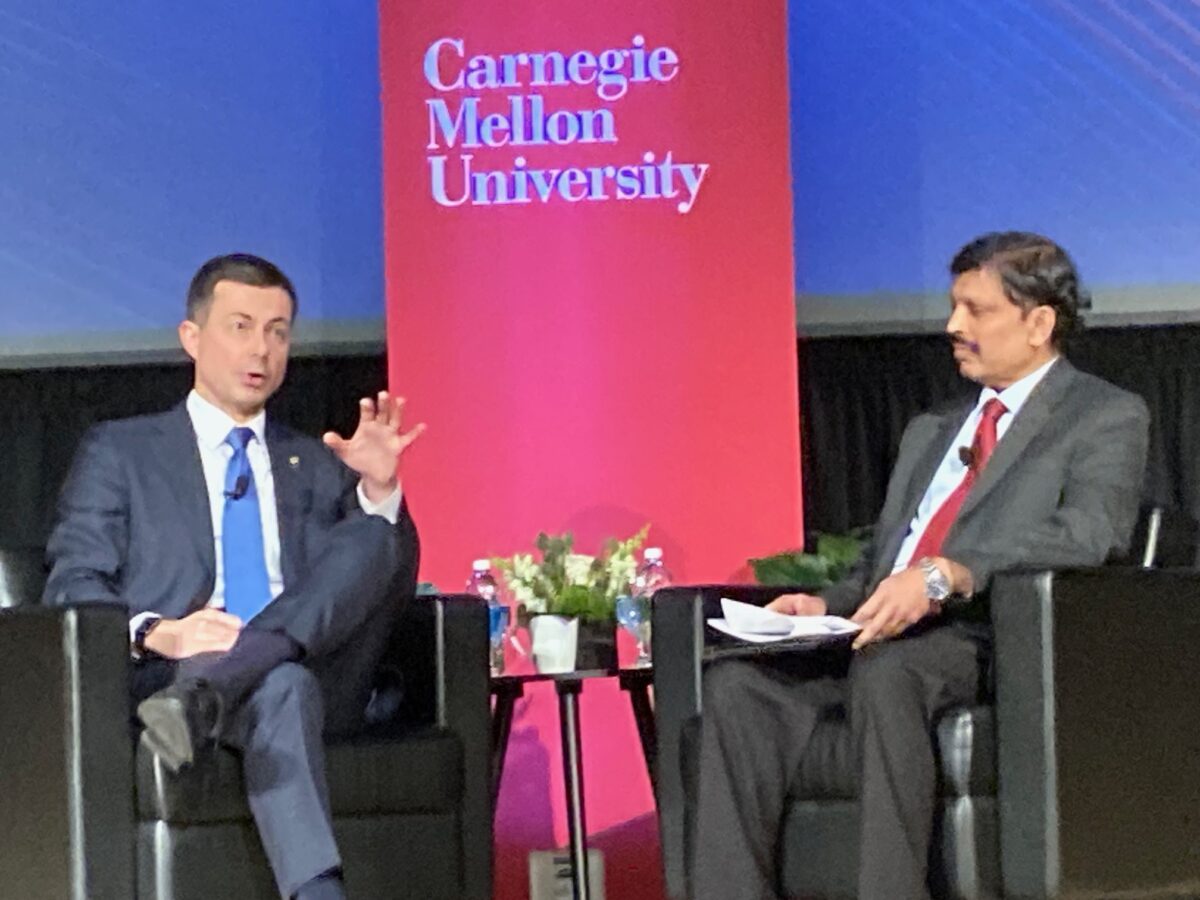U.S. Transportation Secretary Pete Buttigieg said he’d been looking for an opportunity to visit Carnegie Mellon University, a place he considers an idea factory that last year was named as one of the country’s five National University Transportation Centers.
Buttigieg got his chance Friday, when he was in the Pittsburgh area to celebrate a $142.3 million grant for road and busway improvements. He added a side trip to the university to participate in a town hall to hear ideas about the future of transportation infrastructure from engineering students who work with the national center known as Safety21.
The university received a five-year $20 million grant in May from the federal Department of Transportation to lead the consortium to help reduce the sharp spike in traffic deaths that occurred during the pandemic.
The goal is to bring researchers and regional transportation leaders together to develop additional technology that allows vehicles to communicate with one another, traffic signals and roadside warning equipment to create an integrated system that reduces accidents and allows easier travel. Their work will go beyond drivers and passengers to help pedestrians and people with disabilities.
The consortium also includes Morgan State University, Ohio State University, University of Pennsylvania and the University of Texas Rio Grande Valley, Community College of Allegheny County and the Community College of Philadelphia.
The CMU-led group is the only one dedicated to safety improvements.
“We believe your insights will help us save lives,” Buttigieg told students.
In the forum, Buttigieg wasn’t disappointed.
In more than an hour at Cohon University Center with Safety21 director, professor Raj Rajkumar, Buttigieg took questions and suggestions from students that ranged from how his appointment as the first openly gay cabinet member has shaped his transportation perspective to airline flight delay payments, increased technology, the use of artificial intelligence in transportation and airline mergers.
His answers:
- Being aware of the fairness and equity issues faced by the gay community makes him more sensitive to those kinds of issues in transportation. He believes the department is more aware of items such as whether fewer bridges are being fixed in low-income or rural areas. It has become “part of the practice of what we do” to be aware of those types of issues, he said.
- The requirement for Southwest Airlines to pay passengers $75 for extended flight delays for three years as a result of problems in the 2022 holiday season could move the U.S. closer to the more liberal European Union model that provides substantial reimbursements for delays. He wouldn’t be surprised if other airlines voluntarily move toward Southwest’s program because it will be good business.
- Technology isn’t moving as quickly as predicted, noting that companies expected thousands of fully automated cars on the road by now, but so far there aren’t any that allow a driver to be completely inattentive. “Anything that enhances the safety of our roadways has our attention,” he said.
- Artificial intelligence probably won’t take over areas like air traffic control, but it could be helpful in areas such as administering grant programs and urban planning. “I can’t wait to see what you develop here,” he said.
- His department and the Department of Justice will continue to be wary of airline mergers such as the proposed Spirit-JetBlue combination that was shot down by a federal court ruling Jan. 19. Such mergers may not be good for consumers, he said. “Companies are going to do whatever regulators let them,” he said. “We clearly have some problems in the trajectory [the airline industry] is taking.”
Overall, Buttigieg said he remains bullish on the American ideal of the next generation being better off than the current one.
“If we can manage this generation right … The future will be better than the past. It’s contentious now. But [that possibility] is still there. That’s what blows my sails.”
Ed covers transportation at the Pittsburgh Post-Gazette, but he's currently on strike. Email him at eblazina@unionprogress.com.



